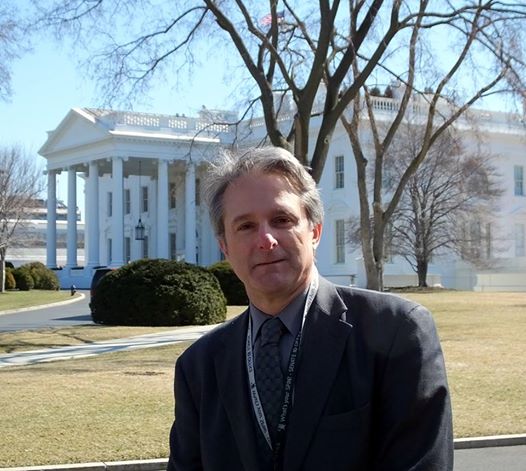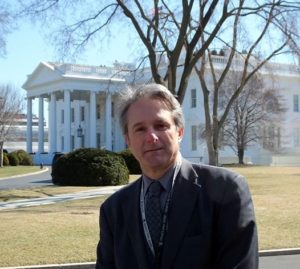OPINION
VOA Managers Sudden Focus on Balance Coincides With Pack Arrival PART THREE
by Dan Robinson
There was a sudden spurt of activity by Voice of America (VOA) news managers after the final U.S. Senate confirmation and later arrival at the U.S. Agency for Global Media (USAGM) of new CEO Michael Pack. Here is what is known based on sources within the agency who requested anonymity to comment freely to BBG/USAGM Watch.
At least two individuals who played key roles at VOA over the past two decades were reassigned or given additional tasks.
One was Steve Springer, who once headed VOA’s central news division and in recent years was overseeing VOA standards and practices, producing the VOA Best Practices Guide.
Readers will recall that Springer had to issue a statement clarifying that he had not been fired by Michael Pack (as was erroneously reported by Anne Applebaum in The Atlantic), only reassigned to a new role reporting to USAGM chief operating officer Andre Mendes (who made a return to the agency).
Springer was among a group of individuals that arrived at VOA after occupying roles at CNN and Al-Jazeera and rose quickly to mid to high six-figure salary positions (see this link for information about salaries for USAGM employees).
Senior VOA news editor David Jones, who came to VOA in the early 2000s and rose rapidly in the management hierarchy, was assigned to focus on quality control issues.
Jones had been preparing and issuing emails showing how many “views” various VOA stories get from online users (many of these, obtained by BBG/USAGM Watch, showed anemic levels of traction considering routine claims made by the agency of audience figures increasing year after year by the tens of millions).
To be more specific, Jones was tasked with looking at objectivity and balance issues that were clearly a concern of the incoming USAGM CEO and members of his team, and which had also been reported on for years by BBG/USAGM Watch.
Another key player is Yolanda Lopez, who has headed VOA’s central news division, and previously led VOA’s Latin American division, though she is a native of Spain.
Lopez was reported by several sources to have held an urgent meeting with newsroom staff to discuss concerns about balance in VOA’s reporting on the Black Lives Matter protests that followed the death of George Floyd in Minneapolis.
Another development is the establishment of what is being called a News Center Style Committee, which would as an internal email explained be “an informal, grassroots committee that looks at how we use style — words, images, sounds — to be inclusive in our storytelling, which is part of our work in telling America’s story . . .”
A Baked In Level of Bias and Partisanship
So, why all of this activity coinciding with the arrival of Michael Pack and targeting questions of objectivity and balance in VOA content that Pack certainly has an interest in seeing addressed?
Here’s the answer: agency sources who requested anonymity to speak freely with BBG/USAGM Watch, describe what amounts to a baked in level of bias and partisanship in VOA reports and in the editing process in central news.
One has to look no farther than events under ex-director Bennett to see the level of concern over this issue, and the actions triggered by it including Bennett’s order for staff to undergo mandatory training in avoiding personal bias in reporting.
Steve Springer was the official tasked with organizing those curative sessions, which began in 2017, and involved an outside consultant/trainer working for the Poynter Institute for Media Studies.
These training sessions, titled “Balanced and Bias-Free Reporting” pledged to:
“. . .tackle one of the toughest challenges for any journalist-how to be fair and thorough even while covering a highly emotional and divisive issue. We will use real stories from the news to help you detect words, images and sources that may be sending signals to your audience about your own opinions. We will touch on how a journalists’ private life including private social media postings can influence public opinion about that person’s journalism and about the news organization’s reputation as well…”
Over the decades, it has been quite typical for management to respond to huge problems by ordering training classes. So, it’s timely, and a bit predictable given the transition underway at USAGM, that VOA recently announced a new round of these sessions (using Zoom due to the COVID-19 situation).
Exactly how many in total of VOA’s journalistic staff have participated since 2017 remains unknown. Obtaining such information would likely require filing of Freedom of Information Act (FOIA) requests which the agency is notorious for slow walking and resisting.
One agency employee who participated called the session “a sham” noting that the trainer began by acknowledging that he was a liberal, and focused mainly on how headlines on VOA articles could be perceived as one-sided.
No time was devoted, according to this account, to news story content and the importance of ensuring appropriate balance by including both sides of an issue and devoting, as much as possible, equal time to the sides.
Steve Springer declined to comment when asked for his views assessing the anti-bias training. David Jones did not respond to a request for comment about his new focus on balance and accuracy issues.
Hostility and Resistance: Houston We Have a Problem
One agency source who requested anonymity to comment freely on the matter described general reaction to the anti-bias sessions this way:
“[There were group meetings at VOA] in recent years [in which people were implored] not to show bias in their social media posts . . but the newsroom crowd was clearly hostile to that idea…[warnings] about avoiding bias and making sure stories are balanced are not [taken seriously] by newsroom staff because there is no enforcement by editors who basically are in cahoots with newsroom writers in promoting anti-Trump narratives.”
Wow. The mere fact that remedial training was considered necessary is an astounding development, especially in an organization that spends considerable time portraying itself as unbiased and objective.
Just as astonishing is the description of hostility to efforts to bring out-of-control balance issues under control, and the assertion that editors in the newsroom were basically tolerating anti-Trump narratives.
It should be noted that these sessions coincided with a series of reports and commentaries (including by this author) about various VOA reporters and on-air personalities using social media to voice personal political views.
Equally disturbing is that sources continue to report and bring to the attention of observers external to USAGM, examples of reporting and social media activity by employees that are “clearly biased” in relation to the Trump administration, with an additional potential effect of potentially misleading VOA’s global audience.
Sources highlight a number of areas of concern, but here is a partial list:
- VOA reports and social media activity showing a clear bias against President Trump and administration policies.
- Reports and social media content on the ongoing controversial issue of immigration that took a resistance journalism approach regarding administration policies.
- Reports about U.S. Middle East and Iran policy that failed to adequately reflect views of all sides (including a social media post by a VOA contractor who demonstrated bias toward an Iranian opposition group).
- Regarding U.S. politics, reports that primarily reflected liberal political viewpoints on major issues and minimized or excluded conservative opinions.
- Social media activity and main reportage by some key VOA beat reporters, and other employees that continue to violate VOA’s own standards and practices guidelines.
On the question of accuracy and balance, BBG/USAGM Watch obtained from several agency sources copies of emails sent to editors about how VOA was reporting specifics of George Floyd’s time of death and reporting on demonstrations that took place.
Referring to stories about the protests, Jones (mentioned above) noted that some VOA reports had called them “possibly the worst civil violence since the 1960s.” “Not by a long shot . . .” Jones stated, recalling for staff the Rodney King riots in 1992.
“Saying that Floyd had died on the street, or died with a policeman’s knee on his neck, or that his death was captured on video. . .while the autopsy report of asphyxiation suggests he probably died on the street, that is not yet clear. He was not officially pronounced dead until almost an hour later at the hospital.”
In one note on George Floyd stories, Jones remarked that VOA editors were acknowledging “that some of us are still not getting this right” prompting him to repeat earlier guidance on the importance of accurate police reporting.
Also addressed was VOA reporting on the shooting in Atlanta of Raychard Brooks, and other accuracy problems in VOA copy.
Amid all of this, the VOA Best Practices Guide was updated again, and urged writers and editors to:
“pay particular attention to balance. If it’s a protest of 200 people and only one of them shows up (for instance) in a Nazi uniform, don’t make the Nazi pic the lead art — it’s not fair to the 199 non-Nazi-uniform-wearing people who attended. And they will let you know it.”
Discussions of this nature can be seen as normal for any news organization, but the significance here has been the timing – a significant internal push on the issue of balance after it was clear Michael Pack was on his way in to USAGM.
READ PART ONE
READ PART TWO
Wait and Check Our Homepage or Here for Parts Four and Five
Dan Robinson retired in 2014 after 34 years with the Voice of America. In addition to his assignment as senior White House correspondent from 2010 to 2014, he served as bureau chief in Nairobi, Kenya and Bangkok, Thailand. He was also the chief of the VOA Burmese Service and the Capitol Hill correspondent. Views expressed here are his own.

